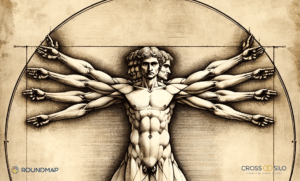We are honored to introduce our nominee for the first Grandmaster of Business Award™, 2021. But before we present our acclaimed nominee, we would like to explain more about the Grandmaster of Business™, the Award, and its decoration.
Demand for the Grandmasters of Business™
Specialists and business owners alike are all too familiar with the benefits of having a depth of expertise in a particular field. But what about people with a breadth of perspective?
Harvard Lecturer Vikram Mansharami wrote: “Broad-minded people are often dismissed as dabbling without adding business value.” However, as found by Harvard’s Heidi Gardner:
“As innovation hinges more and more on interdisciplinary cooperation, digitalization transforms business at a breakneck pace, and globalization increasingly requires people to work across national borders, the demand for executives who can lead projects at the interfaces keeps rising.”
Indeed, how can a specialist lead projects across the disciplinary interfaces while wearing functional blinders? Upton Beall Sinclair Jr.: “You can’t make somebody understand something if their salary depends upon them not understanding it.”
We need to go back to understand our love affair with depth and the dismissal of breadth.
Before the Industrial Revolution, most businesses were relatively small operations. Owners frequently labored next to employees and closely directed the work. Following the Industrial Revolution, workers took control over the work process and worked only as hard to avoid getting fired. Business owners were desperately looking for ways to increase worker productivity.
At the beginning of the 20th century, people like Frederick W. Taylor, Frank and Lillian Gilbreth, and Henry Gantt introduced the scientific management method. It was an evolution of work that drove worker productivity using scientific analysis.
This process of analyzing work (Greek: analysis, literally “a breaking up, a loosening, releasing”), which came at the expense of craftsmen and artisans (the generalists), led to a functional decoupling of the entire work process. Groups of specialists, known as teams, were made responsible for a small part of the activities.
In 1979, Michael Porter introduced the Value Chain theory to link these activities together while differentiating between primary (frontline) and secondary (frontline-supporting) activities.
Management monitored teams based on their output. As one team depended on the other, employees started to blame each other for poor performance. Some units even perceived other units as competitors, thereby creating more distance between the teams, leading toward the siloed operations we’re seeing today.
As such, we believe Porter’s analogy of a linked chain was not realistic. More often than not, the overall process is a string of beads, held together by a fragile string. As long as management keeps the string tight enough, communication between the beads could occur, but in some cases, a jungle drum may be needed. Remember the homemade walky-talky using a piece of string and two cups?
As such, it is almost accepted as the norm that the last beat hasn’t got a clue what the first bead is doing or why ─ Chinese whispers isn’t just a popular children’s game. Clearly, this isn’t an ideal form of cooperation if you plan to create seamless customer experiences or need to prepare for rapid change.
Characterizing the Grandmasters of Business™
Vikram Mansharami wrote: “The rapid advancement of technology, combined with increased uncertainty, is making the most important career logic of the past counterproductive going forward. To put it bluntly, the world has changed, but our philosophy around skills development has not. Today’s dynamic complexity demands an ability to thrive in ambiguous and poorly defined situations, a context that generates anxiety for most because it has always felt safer to generalize. But as the typical mutual fund disclaimer so famously states, past performance is no guarantee of future results. It’s time to rethink our love affair with depth. The pendulum between depth and breadth has swung too far in favor of depth.”
Consequently, the Grandmaster of Business™ needs to:
- Be able to zoom out and pay more attention to the context when making decisions.
- Be able to think bigger and broader than we’ve traditionally done.
- Be able to synthesize problems, thereby considering both the context and the meaning of the problem, as part of the more extensive system.
- Be able to study the interconnections across industries and imagine how changes in one domain can disrupt operations in the other.
- Be able to adjust the course of action as a situation evolves.
- Have a general cognitive ability over role-related knowledge (having a depth of expertise).
- Have obtained a diversity of geographic and functional experiences.
- Have vast analytical capabilities, including statistical skills and critical reasoning.
- Embrace being divergent.
Vikram added: “The one certainty about the future is that it will be uncertain. The rapid advancement of artificial intelligence and technological innovation have commoditized information. The skill of generating dots is losing value. The key skill of the future is not quite a skill; it’s an approach, a philosophy, and way of thinking — and it’s critical you adopt it as soon as you’re able.”
The Grandmaster of Business Award™
While we train people to become a Grandmaster of Business™, some individuals have obtained their depth of expertise and breadth of perspective throughout their careers. They are a master in their own right. They are typically past the age of 50, more observational, have a greater sense of awareness, and rise above the superficial delusions of the day in search of reflection.
We wanted a symbol that characterizes such an extraordinary person. This led us to Greek mythology and a Centaur by the name of Chiron in particular.
Chiron was perhaps the greatest Centaur in classical Greek mythology. He was abandoned by his parents, Zeus and Philyra, but rescued by a shepherd who took him to the Sun god Apollo with whom he went through various initiation rites and learned medicine, music, and other skills. Chiron became a skilled healer and teacher who tutored Achilles, Asclepius, Hercules, Jason, and other heroes.
Symbolic of its position in the Solar System between Saturn and Uranus, Chiron is also seen as a bridge between conventional and revolutionary structures. We can see this in the Greek root ‘cheir’ (meaning hand) of the name, which is shared with the Chiropractic profession that has elements of conventional medical practice combined with more alternative or holistic approaches to health and healing. We can also recognize this theme of integrating two worlds through the symbolism of the Centaur being half-human and half-animal.
Graphically, Chiron is shown as a glyph of a ‘key’ that some associate with transcendence and moving beyond the limits of three-dimensional reality and into higher levels of awareness and consciousness, merging heaven and earth. Like Chiron’s relatively small size as a celestial body located beyond the limits of what can be seen by the unaided eye, it can also describe things that are invisible or that seem insignificant but, in actuality, are pretty powerful. Chiron appears to represent something beyond our ordinary or mundane understanding that transcends and synthesizes what came before with the potential of the future.
Our nominee for the Grandmaster of Business Award 2021
It wasn’t difficult to identify our first nominee. We have the privilege to work alongside our nominee as part of a ‘seal team’ of a boutique marketing and management consultancy.
Our esteemed nominee is: Jay Abraham.
Jay Abraham is known as the 21.7 Billion Dollar Man and the Highest-Paid Marketing Consultant globally. Jay is the mentor to mentors and has a track record that is hard to beat by anyone.
Jay increased the bottom-line of over 10.000 clients in over 400 industries worldwide. According to Tony Robbins, Jay Abraham is the go-to marketing consultant, while Jay has influenced many great marketing consultants. Daymond John, known from Shark Tank, says he owes much of his career to Jay Abraham. Forbes called him “The Real Thing” and listed Jay as one of the top 5 Executive Coaches in the country. The list goes on and on.
We’re currently preparing the ornaments associated with the nomination.
























